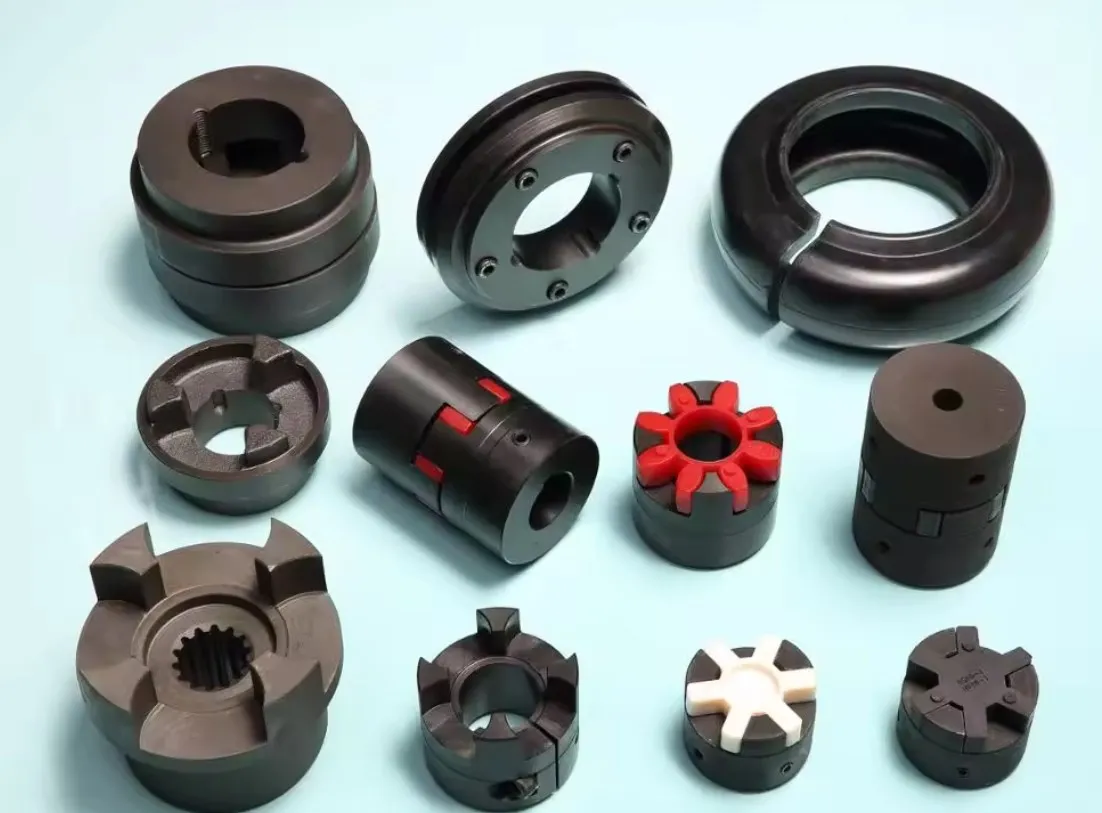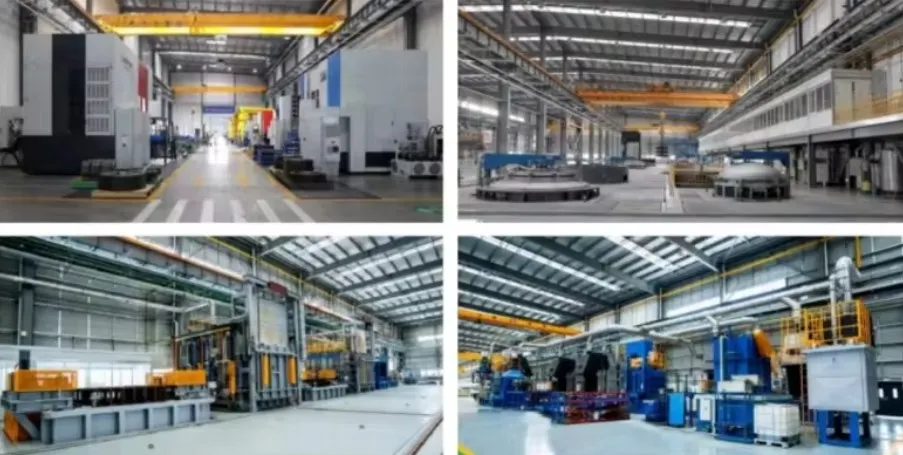Elastic coupling for thermal power stations
Introduction to Elastic Couplings
Elastic couplings are essential components in thermal power stations, facilitating the smooth transmission of power between shafts while accommodating misalignments and reducing vibrations. They help enhance operational efficiency and longevity of machinery.
Importance of Elastic Couplings
Elastic couplings play a pivotal role in minimizing mechanical wear and tear, thereby reducing maintenance costs and downtime. They also help in mitigating noise pollution, ensuring a quieter work environment.
Materials Used in Elastic Couplings
Typically, elastic couplings are made from various high-grade materials such as nitrile rubber, polyurethane, and thermoplastic elastomers. These materials are chosen for their resilience and ability to absorb shocks and vibrations.
Design and Structure
The design of elastic couplings usually involves interlocking elements that can deform to absorb misalignments. The structure is engineered to optimize load distribution and torque transmission between connected shafts.
Applications in Thermal Power Stations
In thermal power stations, elastic couplings are used to connect turbines, generators, and other critical machinery. They ensure the continuous and efficient transfer of power, which is crucial for uninterrupted energy production.
Advantages Over Rigid Couplings
Elastic couplings offer several advantages over rigid couplings, including the ability to accommodate misalignments, absorb shocks, and reduce mechanical stress on connected equipment. This leads to a more reliable and durable system.
Maintenance and Longevity
Proper maintenance of elastic couplings can significantly extend their lifespan. Regular inspection and replacement of worn elements are essential to maintain optimal performance and prevent unexpected failures.
Installation and Alignment
Correct installation and alignment are critical to the performance of elastic couplings. Misalignment can lead to premature wear and failure, so it is vital to follow the manufacturer’s guidelines during installation.
Types of Elastic Couplings
Different types of elastic couplings are available, each designed for specific applications. Common types include jaw couplings, tire couplings, and bellow couplings, each offering unique benefits.
Performance Metrics
Performance metrics such as torque capacity, misalignment tolerance, and operational temperature range are crucial for selecting the appropriate elastic coupling for a given application.
Economic Benefits
Investing in high-quality elastic couplings can lead to significant economic benefits by reducing maintenance costs, downtime, and extending the lifespan of connected machinery.
Environmental Impact
Elastic couplings contribute to a lower environmental impact by enhancing the efficiency of power transmission systems, thus reducing energy losses and associated emissions.
Technological Advancements
Recent technological advancements have led to the development of more robust and efficient elastic couplings, incorporating innovative materials and design tweaks to meet the evolving needs of thermal power stations.
Case Studies
Several case studies demonstrate the successful implementation of elastic couplings in thermal power stations, showcasing improvements in efficiency, reliability, and overall performance of the power generation systems.
Conclusion
Elastic couplings are indispensable in thermal power stations, offering numerous benefits that enhance operational efficiency and longevity of machinery. Their role in minimizing mechanical stress and accommodating misalignments makes them a crucial component in power transmission systems.

High Elastic Rubber Coupling
Enhanced Flexibility
High elastic rubber couplings offer superior flexibility, allowing for greater accommodation of misalignments and reducing mechanical stress on connected equipment.
Vibration Damping
These couplings are highly effective in damping vibrations, leading to quieter operation and less wear on machinery. This is particularly important in applications where noise reduction is a priority.
Shock Absorption
High elastic rubber couplings excel in absorbing shocks, protecting the system from sudden impacts and prolonging the life of mechanical components.
Durability
Constructed from top-quality rubber materials, these couplings are built to withstand harsh conditions, ensuring long-term durability and reliable performance.
Maintenance Efficiency
With fewer components and easy-to-replace elements, high elastic rubber couplings facilitate efficient maintenance, reducing downtime and associated costs.

What are flexible couplings used for?
Accommodating Misalignments
Flexible couplings are primarily used to accommodate misalignments between connected shafts, ensuring smooth and efficient power transmission.
Vibration Reduction
They are instrumental in reducing vibrations, which helps in maintaining the integrity of the machinery and prolonging its lifespan.
Shock Absorption
Flexible couplings absorb shocks and sudden impacts, protecting the system from potential damage and enhancing overall reliability.
Noise Reduction
By damping vibrations and absorbing shocks, flexible couplings contribute to noise reduction, creating a quieter and more comfortable working environment.
Thermal Expansion Accommodation
These couplings can accommodate thermal expansion of shafts, preventing mechanical stress and potential damage due to temperature fluctuations.

What are the three types of coupling?
Rigid Couplings
Rigid couplings are used when precise alignment is required. They do not accommodate misalignments and are typically used in applications where shafts are perfectly aligned.
Flexible Couplings
Flexible couplings, such as elastic couplings, can accommodate misalignments and absorb shocks and vibrations, making them suitable for a wide range of applications.
Fluid Couplings
Fluid couplings use a hydraulic fluid to transmit torque between shafts. They are mainly used in applications requiring variable speed and controlled start-up processes.
How to select or customize a suitable elastic coupling
Torque Requirements
Determine the torque requirements of your application to ensure the selected coupling can handle the load without failure.
Misalignment Tolerance
Assess the level of misalignment between shafts and choose a coupling that can accommodate the expected angular, parallel, and axial misalignments.
Operational Speed
Consider the operational speed of the system. High-speed applications may require couplings designed to maintain balance and reduce vibrations at higher RPMs.
Environmental Conditions
Evaluate the environmental conditions, including temperature, humidity, and exposure to chemicals. Select a coupling made from materials that can withstand these conditions.
Maintenance and Longevity
Opt for couplings that offer easy maintenance and have a long service life to minimize downtime and maintenance costs.

About HZPT
HZPT was established in 2006 and is a professional manufacturer specializing in the research and production of high-precision couplings, ball screw support units, motor brackets, and motion modules. Our coupling product line includes servo motor couplings, stepper motor couplings, miniature motor couplings, encoder couplings, and more.
Advantages
-
Advanced Technology
We employ cutting-edge technology in our manufacturing processes, ensuring high-quality and reliable products.
-
In-house R&D Center
Our dedicated R&D center enables continuous innovation and improvement of our products to meet the evolving demands of the industry.
-
In-house Processing and Testing Systems
With our own processing and testing systems, we ensure rigorous quality control and product consistency.
-
ISO 9001:2015 Certification
We are ISO 9001:2015 certified, reflecting our commitment to maintaining high standards of quality management.
-
ROHS Compliance
Our products are ROHS compliant, ensuring they are environmentally friendly and safe for use in various applications.
Currently, we have more than 144 product lines widely used in electronics, solar energy, photovoltaic industry, machine tools, packaging, molds, medical, printing, and various automation machinery. Our products have been recognized and widely used by top customers globally, including those in Japan, the USA, Germany, Israel, Malaysia, Singapore, and Taiwan.
Our Elastic Couplings
Our elastic couplings are designed for optimal performance and durability, making them ideal for various industrial applications. We invite you to explore our range of products and experience the benefits of partnering with a company dedicated to innovation and quality. Contact us today to learn more about how our products can meet your specific needs and enhance your operational efficiency.